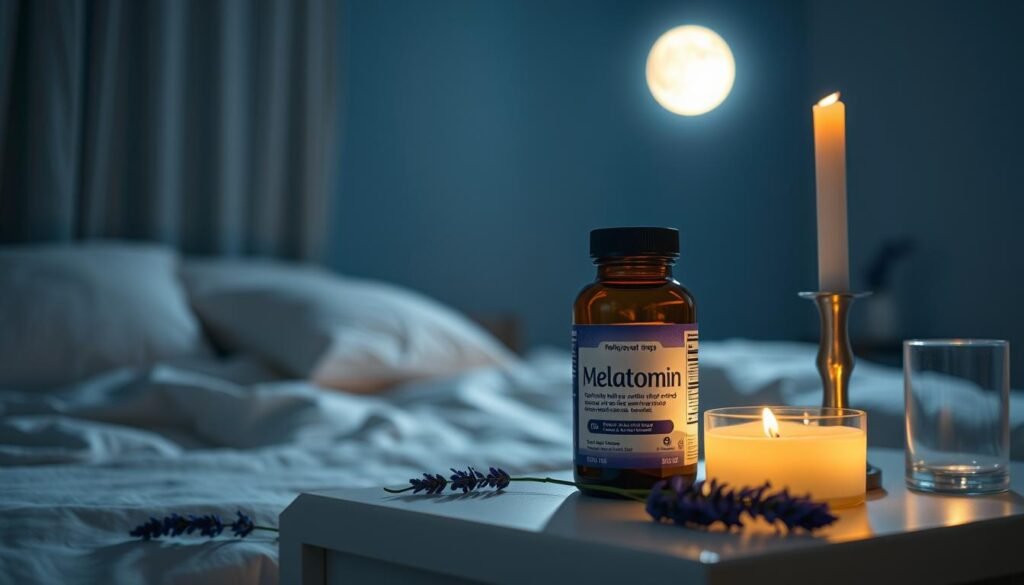Did you know that anxiety impacts nearly 20% of US adults each year? It also affects 1 in 4 teens aged 13 to 18. This fact shows a significant mental health issue, leading often to poor sleep. As anxiety becomes a larger part of our lives, more people are looking for natural ways to ease it. Melatonin, a natural hormone, is getting noticed. It does more than manage our sleep cycles – it might also help with anxiety.
In this guide, we’ll examine how melatonin and anxiety are connected. We’ll look at the science showing its calming effects. The aim is to show how melatonin can be a part of managing stress. By understanding melatonin, we can find natural treatments. These might improve sleep and mental health.
Key Takeaways
- Anxiety impacts a significant portion of the adult population and many adolescents.
- Melatonin is a natural hormone that can help improve sleep and manage anxiety.
- Research suggests potential benefits of melatonin in reducing anxiety levels.
- Various forms of melatonin supplements are available for consumer use.
- Consulting a healthcare professional is advisable before starting melatonin.
- Understanding melatonin’s role can lead to effective natural relief strategies.
Understanding Melatonin
The melatonin hormone is key to regulating our sleep and well-being. Knowing how it works in our bodies highlights its role in sleep. It also shows what happens when there’s a hormonal imbalance.
What is Melatonin?
Melatonin is a hormone made by the pineal gland in our brain. It controls our sleep and awake cycles. When it gets dark, our bodies make more melatonin, making us sleepy. On the other hand, light, particularly blue light from screens, can lower melatonin production. This can mess up our sleep and may lead to mood issues like anxiety.
How Melatonin is Produced in the Body
Melatonin starts with tryptophan, an amino acid found in certain foods. People make different amounts of melatonin based on their age. Younger people usually have more. But, health problems like type 2 diabetes and Alzheimer’s can reduce melatonin levels. A boost in melatonin at night helps us sleep well. Without enough melatonin, we may have trouble sleeping and feel anxious. This shows why it’s crucial to keep melatonin levels healthy.
The Connection Between Sleep Disorders and Anxiety
Understanding how sleep disorders and anxiety disorders relate is vital. Sleep problems often go hand in hand with anxiety, setting off a tough cycle. Here, poor sleep makes anxiety worse, and more anxiety can cause sleep issues. This cycle can badly affect mental health.
The Impact of Sleep on Mental Health
Not getting enough sleep can really hurt your mental health. Those with anxiety often have trouble sleeping. This can make their anxiety worse. Recognizing sleep’s role in managing anxiety is key to mental health care.
Common Sleep Disorders Related to Anxiety
People with anxiety may face many sleep disorders. These issues can prevent them from getting restful sleep. Conditions often include:
- Insomnia: Hard time falling or staying asleep, usually due to anxiety.
- Hypersomnia: Feeling overly sleepy during the day, or sleeping too much at night.
- Sleep Apnea: Breathing stops and starts in sleep, often linked to anxiety.
It’s crucial to tackle these sleep disorders to help ease anxiety. Effective treatment linking sleep health and anxiety can bring better results.

| Sleep Disorder | Symptoms | Link to Anxiety |
|---|---|---|
| Insomnia | Difficulties falling or staying asleep | Increased anxiety levels |
| Hypersomnia | Excessive daytime sleepiness | Can lead to feelings of inadequacy and increased anxiety |
| Sleep Apnea | Interrupted breathing during sleep | Associated with increased anxiety symptoms |
Melatonin and Anxiety: Exploring the Relationship
Melatonin is key in controlling our moods and is vital for a healthy sleep cycle. The body makes more melatonin when it’s dark to help us sleep. For those dealing with anxiety, especially with sleeping problems, knowing about melatonin is useful.
How Melatonin Helps Regulate Sleep-Wake Cycles
Melatonin helps keep our body’s sleep cycles on track, which improves sleep. It works against cortisol, the stress hormone that ruins sleep. By managing sleep patterns, melatonin lowers anxiety symptoms like high heart rate and blood pressure that happen in stressful times.
Research Findings on Melatonin’s Role in Anxiety Relief
Recent studies show a positive connection between melatonin and reduced anxiety. One study found melatonin lowered anxiety levels in participants, especially with added therapies. Another study saw improved sleep and less anxiety in patients with brain injuries from trauma. These studies show melatonin’s role in mood regulation and its potential in treating anxiety.
To find ways to lower stress, check out practical tips for managing anxiety and improving mental health.

Benefits of Melatonin for Anxiety Relief
Exploring melatonin shows it can help mental health. Its role in reducing anxiety is getting clearer with more research. For those looking for non-drug options, melatonin is safe and effective.
Potential Anxiolytic Effects of Melatonin
Studies suggest melatonin can lessen anxiety, especially before surgery. A 2020 study found it works as well as drugs like benzodiazepines. It has fewer side effects, making it an attractive natural solution.
Comparison with Traditional Anxiety Medications
A 2018 analysis compared melatonin to alprazolam, a common anxiety drug. Both offered similar relief, but melatonin had less side effects. This makes melatonin a safer choice for managing anxiety.

For more on natural anxiety relief supplements, visit this link. Learning about them can help in finding safe and effective treatments.
Dosage and Usage of Melatonin for Anxiety
Knowing the right amount of melatonin to take is key for managing anxiety. Each person reacts differently, so a personalized approach is best. Here, we share insights on the best dosages and forms of melatonin.
Recommended Dosages for Optimal Results
Melatonin doses can vary a lot, generally from 1 to 10 milligrams. Studies have found that 3 to 14 mg can help with anxiety, especially before surgery. If you’re dealing with everyday anxiety, start with 1 or 2 mg. Then, you can slowly increase the amount. But, don’t go over 10 mg without talking to a doctor.
Forms of Melatonin Supplements Available
There are many types of melatonin supplements. You can find:
- Tablets
- Capsules
- Gummies
- Sublingual tablets
- Transdermal patches
Each offers different benefits, depending on what you prefer. Choose a product that meets quality standards for the best results. Look for the USP mark for safety and effectiveness.
| Melatonin Form | Typical Dosage Range | Notes |
|---|---|---|
| Tablets | 1 mg to 10 mg | Commonly available and easy to dose. |
| Gummies | 2 mg to 5 mg | Tasty option for those who prefer chews. |
| Sublingual Tablets | 1 mg to 5 mg | Quick absorption under the tongue. |
| Transdermal Patches | 1 mg to 5 mg | Delivers steady doses through the skin. |
Possible Side Effects and Precautions
Melatonin supplements are getting more popular. It’s important to know their potential side effects and how they might react with other medications. Most of the time, side effects are mild, but knowing safety steps can make using melatonin safer.
Mild Side Effects of Melatonin
Common melatonin side effects include:
- Headaches
- Daytime sleepiness
- Dizziness
- Nausea
- Vivid dreams or nightmares
- Stomach cramps
- Mood changes
These effects are usually rare and not severe. However, older adults might feel the effects for longer. This is due to the longer time melatonin stays active in their bodies. Using melatonin for up to three months is considered safe. But, some people need to be more careful than others.
Interactions with Other Medications
Melatonin can interact with other medications, which may increase health risks. For example, people on blood thinners or antidepressants should be careful. Since the safety precautions recommend talking to a healthcare provider, this step is key for those with health issues. Choosing the right dose and a trustworthy supplement brand can help avoid bad reactions and interactions.
Natural Remedies for Anxiety Beyond Melatonin
While melatonin helps with anxiety, looking into other options is a good idea. Many people find different calming supplements useful for stress. Knowing about these options can give you tools to improve mental health.
Other Calming Supplements to Consider
Several natural supplements are becoming popular for easing anxiety symptoms. These include:
- Magnesium: Known for aiding relaxation, magnesium may be crucial for anxiety management.
- L-theanine: Found in green tea, this amino acid helps calm you down without making you sleepy.
- Chamomile: Often used as tea, chamomile has been used for years to help with relaxation and anxiety.
Looking into these supplements can help manage stress in a holistic way.
Integrating Lifestyle Changes for Better Stress Management
Adding changes to your lifestyle can greatly lower anxiety. Some effective tips include:
- Regular Exercise: Exercise releases endorphins, boosting mood and reducing anxiety.
- Balanced Diet: Eating well helps your body and mind, possibly cutting down anxiety.
- Mindfulness Practices: Meditation and yoga can help with relaxation and awareness, which is good for managing stress.
Combining these lifestyle changes with calming supplements can tackle anxiety more fully.
Consulting a Healthcare Professional
Talking to a healthcare expert is important for anyone battling anxiety. It’s crucial for those with severe anxiety or health issues to seek professional help. Getting a thorough health review ensures treatments are customized to each person’s needs.
When to Seek Professional Guidance
Knowing when to get professional help can really make a difference in treating anxiety effectively. Think about setting up a meeting if:
- Anxiety is impacting your everyday activities and duties.
- You’ve tried handling it on your own but haven’t seen progress.
- You have other health problems that affect your anxiety.
- You’re worried about how supplements or medications might affect you.
Importance of Individualized Treatment Plans
Customized treatment plans are key to managing anxiety well. When making a plan, experts look at a few things:
| Factor | Description |
|---|---|
| Symptoms Severity | Checking how bad anxiety symptoms are to adjust the treatment. |
| Medical History | Looking at past health care and conditions that could impact current treatment. |
| Potential Interactions | Examining how melatonin, other medicines, and your health interact. |
| Preferred Treatment Methods | Adding in what kind of care the patient prefers, like holistic or traditional methods. |
With a plan made just for them, patients get treatments that can include melatonin and other methods suited to their needs. This proactive approach doesn’t just manage anxiety but also leads to a healthier, happier life.
Conclusion
Melatonin offers a natural way to manage anxiety, especially for those with sleep problems. Studies show melatonin is not only effective but also a good alternative to standard drugs. It works by regulating our sleep cycles, which improves mental health.
Recent studies have shown melatonin helps reduce anxiety before and after surgery. This is key for patients needing to stay calm for recovery. Still, it’s important to speak with a doctor about how much to take and its interaction with other medicines.
Using melatonin could be part of a bigger plan for treating anxiety. It shows that treating mental health needs a personalized approach. For more info on melatonin’s benefits, check out this study here.